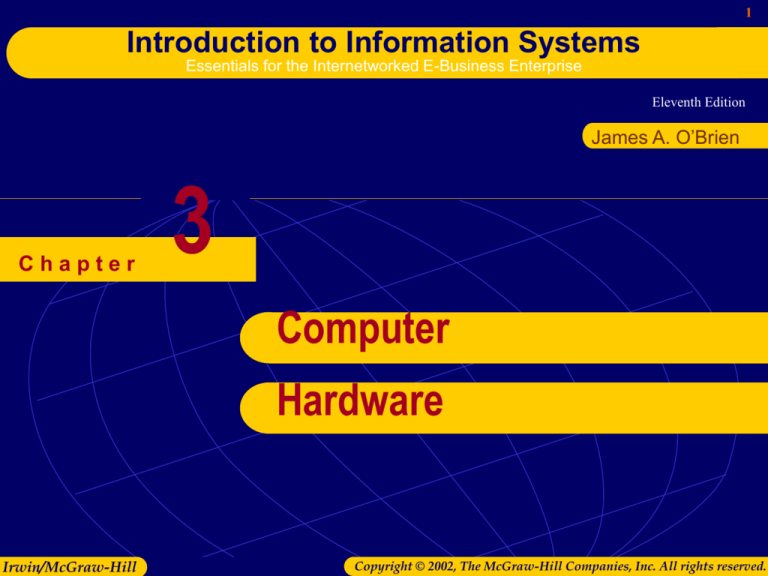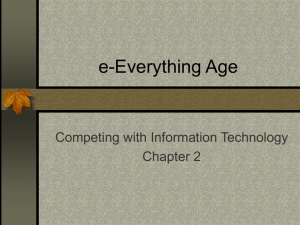
1
Introduction to Information Systems
Essentials for the Internetworked E-Business Enterprise
Eleventh Edition
James A. O’Brien
Chapter
3
Computer
Hardware
Irwin/McGraw-Hill
Copyright © 2002, The McGraw-Hill Companies, Inc. All rights reserved.
James A. O’Brien
Introduction to Information Systems
Eleventh Edition
2
Chapter Objectives
• Identify the major types, trends, and uses of
microcomputer, midrange, and mainframe
computer systems.
• Outline the major technologies and uses of
computer peripherals for input, output, and
storage.
• Identify and give examples of the components
and functions of a computer system.
• Identify the computer systems and peripherals
you would acquire or recommend for a
business of your choice, and explain the
reasons for your selections.
Irwin/McGraw-Hill
Copyright © 2002, The McGraw-Hill Companies, Inc. All rights reserved.
James A. O’Brien
Introduction to Information Systems
Eleventh Edition
3
Computer System Categories
Mainframe
Computers
Midrange
Computers
Microcomputers
Irwin/McGraw-Hill
Copyright © 2002, The McGraw-Hill Companies, Inc. All rights reserved.
James A. O’Brien
Eleventh Edition
Introduction to Information Systems
4
Trends in Computer System Capabilities
First
Generation
Second
Generation
Third
Generation
Fourth
Generation
Fifth
Generation
Trend: Toward Smaller, Faster, More Reliable, and Less Costly
Vacuum
Tubes
Solid-State
Integrated
Circuits
LSI, VLSI
Microprocessors
Greater
Power,
Smaller
Footprint
Trend: Toward Easy to Purchase, and Easy to Maintain
Irwin/McGraw-Hill
Copyright © 2002, The McGraw-Hill Companies, Inc. All rights reserved.
James A. O’Brien
Introduction to Information Systems
Eleventh Edition
5
Microcomputer Systems
• Handheld Computers
– PDA, Information
Appliances
•
•
•
•
Notebook Computers
Desktop Computers
Workstations
Network Server
– Powerful microcomputer
used in small LANs
Irwin/McGraw-Hill
Copyright © 2002, The McGraw-Hill Companies, Inc. All rights reserved.
James A. O’Brien
Introduction to Information Systems
Eleventh Edition
6
Network Computers and Terminals
• Network Computer
(Thin Client)
• NetPC
• Network Terminal
Irwin/McGraw-Hill
Benefits
• Lower purchase cost
• Easier maintenance
• Easier software
distribution and
licensing
• Computer platform
standardization
• Reduced end user
support requirements
• Improved
manageability
Copyright © 2002, The McGraw-Hill Companies, Inc. All rights reserved.
James A. O’Brien
Introduction to Information Systems
Eleventh Edition
7
Computer System Components
Central Processing Unit
Input
Devices
Control
Unit
ALU
Output
Output
Devices
Devices
Special
Primary
Cache
Purpose
Memory Storage
Processors
Secondary
Storage
Devices
Irwin/McGraw-Hill
Copyright © 2002, The McGraw-Hill Companies, Inc. All rights reserved.
James A. O’Brien
Introduction to Information Systems
Eleventh Edition
8
Input Technology Trends
First
Second
Third
Generation Generation Generation
Punched
Cards
Paper Tape
Punched
Cards
Key to Tape/
Disk
Fourth
Generation
Fifth
Generation
Keyboard Data
Entry
Pointing Devices
Optical Scanning
Voice
Recognition
Touch Devices
Handwriting
Recognition
Trend: Towards Direct Input Devices that Are More Natural
and Easy to Use
Irwin/McGraw-Hill
Copyright © 2002, The McGraw-Hill Companies, Inc. All rights reserved.
James A. O’Brien
Introduction to Information Systems
Eleventh Edition
9
Common Input Devices
•
•
•
•
•
•
Keyboard
Pointing Devices
Pen Based Computing
Speech Recognition
Optical Scanning
Magnetic Ink Character
Recognition
• Smart Cards
• Digital Cameras
Irwin/McGraw-Hill
Copyright © 2002, The McGraw-Hill Companies, Inc. All rights reserved.
James A. O’Brien
Introduction to Information Systems
Eleventh Edition
10
Output Technology Trends
First
Generation
Punched Cards
Printed Reports
and Documents
Second
Generation
Punched Cards
Printed Reports
and Documents
Third
Generation
Fourth
Generation
Fifth
Generation
Printed Reports
and Documents
Video Displays
Video Displays
Video Displays
Voice Responses
Audio Responses
Hyperlinked
Printed Reports
Multimedia
and Documents
Documents
Trend: Towards Output Methods that Communicate Naturally,
Quickly, and Clearly
Irwin/McGraw-Hill
Copyright © 2002, The McGraw-Hill Companies, Inc. All rights reserved.
James A. O’Brien
Introduction to Information Systems
Eleventh Edition
11
Common Output Devices
• Video Output
– CRT
– LCD
• Printed Output
– Inkjet
– Laser
Irwin/McGraw-Hill
Copyright © 2002, The McGraw-Hill Companies, Inc. All rights reserved.
James A. O’Brien
Eleventh Edition
Introduction to Information Systems
12
Storage Trends
Primary
Storage
First
Generation
Second
Generation
Third
Generation
Magnetic
Drum
Magnetic
Core
Magnetic
Core
Fourth
Generation
Fifth
Generation
VLSI
LSI
Semiconductor Semiconductor
Memory Chips Memory Chips
Trend: Towards Large Capacities Using Smaller Microelectronic Circuits
Secondary
Storage
Magnetic Tape Magnetic Tape
Magnetic Drum Magnetic Disk
Magnetic Disk
Magnetic Tape
Magnetic Disk
Optical Disk
Magnetic Tape
Optical Disk
Magnetic Disk
Trend: Towards Massive Capacities Using Magnetic and Optical Media
Irwin/McGraw-Hill
Copyright © 2002, The McGraw-Hill Companies, Inc. All rights reserved.
James A. O’Brien
Eleventh Edition
Introduction to Information Systems
13
Primary & Secondary Storage Media
Semiconductor
Memory
Magnetic
Disks
Floppy Disk
Hard Disk, RAID
Magnetic Tape
Optical Disks
CD-ROM, CD-R
CD-RW
DVD
Irwin/McGraw-Hill
Direct
Access
Sequential
Access
Direct
Access
Copyright © 2002, The McGraw-Hill Companies, Inc. All rights reserved.
James A. O’Brien
Introduction to Information Systems
Eleventh Edition
14
Characteristics of Magnetic Disks
Tracks: Concentric circles
for storing data as magnetized
bits.
Cylinders
Access
Mechanism
Access
Arms
Disks
Read/Write
Heads
Track
Sectors:
Portions of a track
Irwin/McGraw-Hill
Copyright © 2002, The McGraw-Hill Companies, Inc. All rights reserved.
James A. O’Brien
Introduction to Information Systems
Eleventh Edition
15
Chapter Summary
• A computer system is a system of information
processing components that perform input, processing,
output, storage and control functions.
• The hardware components in a computer include input
and output devices, a central processing unit (CPU), and
primary and secondary storage.
• There are three major categories of computers:
microcomputers, midrange computers and mainframe
computers
Irwin/McGraw-Hill
Copyright © 2002, The McGraw-Hill Companies, Inc. All rights reserved.
James A. O’Brien
Introduction to Information Systems
Eleventh Edition
16
Chapter Summary (cont)
• Microcomputers are used as personal computers, but are
also interconnected in a variety of telecommunications
networks.
• Midrange computers are increasingly being used as
powerful network servers and for many multi-user
business data processing and scientific applications.
• Mainframe computers are larger and more powerful and
are used to handle information processing needs for
large organizations .
Irwin/McGraw-Hill
Copyright © 2002, The McGraw-Hill Companies, Inc. All rights reserved.
James A. O’Brien
Introduction to Information Systems
Eleventh Edition
17
Chapter Summary (cont)
• Peripheral devices used for input and output come in a
variety shape and sizes. Future trends are towards
devices that communicate naturally and are quick and
easier to use.
Irwin/McGraw-Hill
Copyright © 2002, The McGraw-Hill Companies, Inc. All rights reserved.






